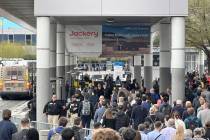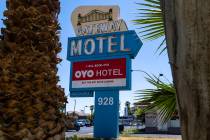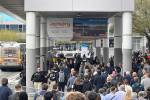Key barrier seen to ‘green’ power
WASHINGTON -- The dearth of power lines in remote areas where the wind blows hardest and the sun shines brightest stands as a major barrier to the nation's use of renewable energy, a Senate committee was told on Tuesday.
A handful of states, including Texas, Minnesota, California and Colorado, and a committee organized by Western governors, is actively planning improvements to transmit electricity generated by solar, wind, geothermal and other natural sources.
But witnesses told the Senate energy committee that building transmission lines is costly and lengthy. The federal government can do more to resolve problems with federal siting and permitting, and with loan guarantees and allocating the costs of power line projects.
The Energy Department in a report last month said wind energy alone could supply 20 percent of the nation's electricity needs by 2030 but transmitting power to where it is needed would be an obstacle.
Sen. Harry Reid, D-Nev., used the hearing to promote a bill to finance construction of transmission systems that would be dedicated in large part to geothermal, solar, wind and other renewable sources.
The bill written last September is an outgrowth of Reid's campaign to discourage Sierra Pacific Resources and other generators from building coal-fired power plants in eastern Nevada.
The 1,500 megawatt Ely Energy Center planned by Sierra Pacific Resources includes a 250-mile transmission line reaching south to Nevada Power and its customers in Las Vegas and north to Sierra Pacific Power in Reno.
Utility executives have said the transmission corridor makes sense only if coal-generated power is the main part of the traffic. Reid took aim at that during his testimony.
"Utility executives like to say that we can't afford to build transmission lines that carry only or mainly renewably generated electricity," Reid said. "They like to say it just doesn't pencil out.
"But if they say that, I just don't think they've really tried very hard or very seriously to crunch the numbers," he said. "Cost is an issue but it is not an excuse for inaction."
The Reid bill would designate zones with potential to generate at least 1,000 megawatts of electricity from renewables and then provide companies with financing to build hookups and transmission lines into the power grid.
If no private companies invested within two years, the government would have $10 billion in bonding authority to finance the transmission lines, which would be required to carry at least 75 percent of their load from renewables, he said.
"The federal government has to add its weight and support to help convince the pencil pushers of the necessity and cost-effectiveness of investing in renewables." Reid said.
Contact Stephens Washington Bureau Chief Steve Tetreault at stetreault@ stephensmedia.com or (202) 783-1760.























